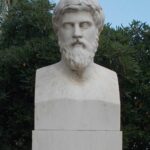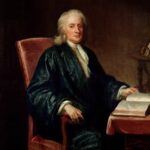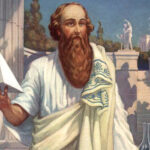SCIENTIST
While Pythagoras was an early proponent of a meatless diet, humans have been vegetarians since well before recorded history. … Pythagoras and his many followers practiced vegetarianism for several reasons, mainly due to religious and ethical objections. Pythagoras believed all living beings had souls.If souls did truly migrate from humans to animals, how could anyone touch meat? What if the steak on your plate was made of your great-grandmother? To avoid such risks, Pythagoras and his disciples lived on a simple diet of bread, honey, and vegetables, a diet he also believed to be healthier than a meat-based one (as modern science shows, he was probably right). For Pythagoras, as for most vegetarians until quite recently, going off meat had little to do with animal welfare. It was not about them, the other creatures. It was all about us, humans, and how being cruel impacts our psyche.

Plutarch
Ancient Greek historian Plutarch could be considered the first outspoken vegetarian, as he was considering that it is “immoral” to eat animal flesh. … Plutarch also argues that man was not made to eat meat: “The fact that man was not made to eat meat is evident in his body structure. Ancient Greek historian Plutarch could be considered the first outspoken vegetarian, as he was considering that it is “immoral” to eat animal flesh. In his book “Morals,” Plutarch has a chapter on meat eating in which he writes that since man has access to so many fresh fruits, vegetables and nuts, it is inconceivable that he is forcing himself to eat bloody animal flesh “trying to cover the taste of blood with thousands of spices.”

Newton
Newton was considered to be vegetarian, mainly in the last years of his life. He also expressed deep compassion for animals and was alleged to be a fervent animal lover. He was credited with the invention of cat doors—the special doors or flaps that allow cats to enter and leave a house
During his time of isolation, Newton was greatly influenced by the Hermetic tradition with which he had been familiar since his undergraduate days. Newton, always somewhat interested in alchemy, now immersed himself in it, copying by hand treatise after treatise and collating them to interpret their arcane imagery. Under the influence of the Hermetic tradition, his conception of nature underwent a decisive change. Until that time, Newton had been a mechanical philosopher in the standard 17th-century style, explaining natural phenomena by the motions of particles of matter. Thus, he held that the physical reality of light is a stream of tiny corpuscles diverted from its course by the presence of denser or rarer media. He felt that the apparent attraction of tiny bits of paper to a piece of glass that has been rubbed with cloth results from an ethereal effluvium that streams out of the glass and carries the bits of paper back with it. This mechanical philosophy denied the possibility of action at a distance; as with static electricity, it explained apparent attractions away by means of invisible ethereal mechanisms.



